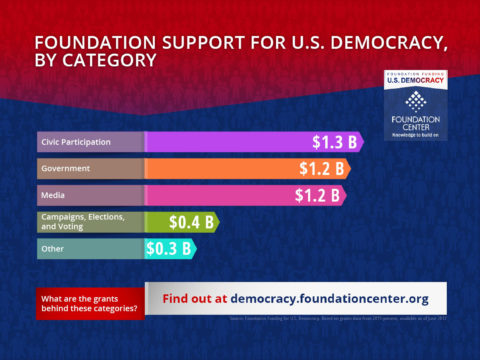What is Giving Compass?
We connect donors to learning resources and ways to support community-led solutions. Learn more about us.
No matter which side of the aisle you lean towards, Americans can all agree on this: A healthy voting process and vibrant civic engagement are essential elements to a functioning democracy.
But philanthropy has largely stayed on the sidelines in this area. According to Foundation Center, less than two percent of all philanthropic funding in the U.S. is focused on grants intended to address public engagement, government accountability, policy advocacy and other civic issues. It’s possible that such a trend is due to a hesitation over bringing divisive politics in the nonprofit sector. Or it may be that funders just don’t know where to begin to address the many gaps in our system.
Whatever the reason, there is a need that can be met, especially when two-thirds of the public believes that voter apathy and the disproportionate influence of money are major problems with our current election process.

Thus, as citizens head to the polls on Tuesday to vote in this year’s midterm elections, it’s worth a reminder that donors can make an impact to improve our democracy — without getting into heated arguments over the dinner table.
Here’s where to start.
(Infographics courtesy of the Foundation Center, which recently added dashboards for users to search top grantmakers and recipients in four major categories: campaigns and elections; civic participation; government/civil liberties; and media.)
Learn
What Rural America Can Teach Us About Civil Society
Stanford Social Innovation Review
Despite vastly different points of view, people who live close to each other need to work together to sustain their communities. This piece explores how rural areas in the U.S. can act as incubators for maintaining this essential balance.
Money In Politics: A Field Scan
Funders’ Committee to Civic Participation
As mentioned, there’s a growing sentiment that money has an undue influence in elections, but what can be done about it? The first step is to have an honest discussion on where things stand and the opportunities for significant reform. (Our own Stephanie Gillis points to several organizations that are leading on this issue.)
Charitable Giving and the 2016 Election: Does Gender Matter?
Women’s Philanthropy Institute
A new report explores how women are leveraging their resources at the intersection of philanthropy and politics, specifically following the 2016 election. Among the key findings: Increases in giving to relevant progressive charities was driven primarily by female donors.
Connect
How to Get Young People to Vote
March for Our Lives Seattle
If there’s one running theme of the 2018 midterm elections, it’s that all eyes are on the kids in America. March For Our Lives is one of many organizations focused on youth voter turnout and education. No matter what happens on Tuesday, this will be an area to watch for years to come.
Why Is It So Stressful to Talk Politics?
The Conversation
This piece explores the psychology behind political arguments and why it’s so difficult to engage with the opposing side. When we feel threatened, we get defensive. Understanding the emotions at work could also help organizations involved in politically-charged areas craft their messages more thoughtfully.
Collaboration Across Difference: A High-Return Investment
Exponent Philanthropy
Employment is the avenue for cooperation discussed here, but the advantages to connecting with diverse stakeholders apply to many types of initiatives — finding common solutions mean that the results are more durable.
Take Action
How We Can Improve the Voter Experience
Bipartisan Policy Center
This report funded by Ford Foundation and The Democracy Fund explores how reducing polling place wait times through increasing resources might help increase civic engagement overall, especially among underserved communities.

Funding the Path to Gender and LGBTQ Justice
Grow Power Fund
The purpose of this fund is to advance leadership and self-determination of vulnerable young people by supporting emerging youth-led feminist, trans, and queer organizations among communities of color and low-income people.
Six Models For Understanding the Impact of Funding Democracy
The Democracy Fund
This fund invests in organizations working to ensure that our political system is able to withstand new challenges and deliver on its promise to the American people. There are no silver bullets, but the Democracy Fund's approach is to embrace complexity and develop a deep, holistic understanding of the problems at hand. In this post, they explain six different methods for measuring impact in this sector.
Teaching Midterm Elections: Walk That Minefield Courageously
iCivics
Teaching civics to students, especially in this heated political environment can be dicey — but educators must be careful and courageous. From talking about ideas (rather than people) to seeking understanding (rather than “winning” an argument), here are some steps to take that we all can learn from.
American Democracy: Reversing a Crisis of Confidence
George W. Bush Institute | Freedom House | Penn Biden Center
The Democracy Project has identified the extent of the crisis of confidence that is undermining American democracy and how to reverse it. It also has recommendations for ways philanthropists can form bipartisan efforts to follow through.